When a hunter is joined by a gun dog on the field they create an unstoppable team, but “What is a gun dog?”
Gun dogs are special dogs( well, all of them are!) They are great sniffers which human noses could never. In this blog, we are going to understand about gun dogs in detail, all of it! So, stay tuned if you find them interesting….
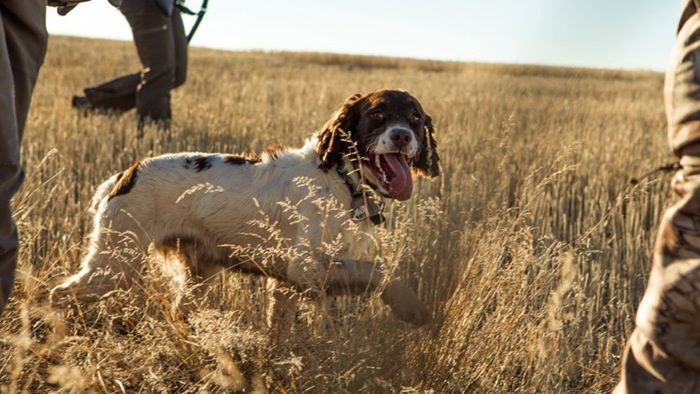
What Is a Gun Dog?
A gun dog is not just a dog but a skilled companion when you are out hunting. They are carefully bred and trained to assist hunters with their unique instincts and vital abilities.
Gun dogs have a remarkable set of instincts that set them apart. Their sharp sense of smell, outstanding obedience, and natural retrieving skills make them great hunting partners on the field.
These natural abilities are improved through training and transforming them into something more great. Now let’s see the different types of gun dogs:
1. Retrievers
Retrievers shine as gun dogs thanks to their friendly nature, intelligence, and exceptional ability in the water. Their waterproof coats and webbed feet make them well-equipped for fetches from lakes and ponds.
Two of the most popular retriever breeds are Labradors and Golden Retrievers. Labrador Retrievers, with their sturdy build and eager-to-please attitude, relish plunging into the water to retrieve downed birds.
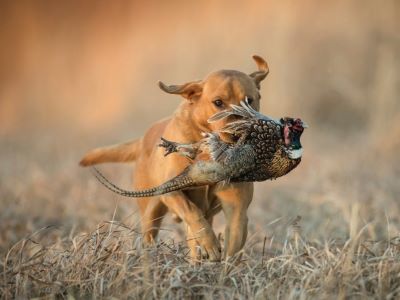
They have tremendous strength and stamina for repeated water entries to fetch ducks and geese no matter the conditions. Golden Retrievers possess a gentle temperament and bring flexibility to the fields.
Eager to please and quick to learn, they adapt well to different hunting situations and games. Their beautiful golden coats impervious to water help them battle lakes and ponds to retrieve waterfowl.
The natural love of water shared among retriever breeds, coupled with an unmatched desire to collect downed birds in their soft mouths, make them priceless partners during waterfowl season.
Their enthusiasm and talents for water work take hunting to another level. Man’s affection for dogs continues to deepen thanks to the pleasing nature and working abilities of these sporting companions.
2. Pointers
Pointers earn their name from their signature move, the stylish point. When these elegant athletes catch the scent of birds, they freeze in dramatic fashion, front leg upraised, to signal trophy game hiding nearby. Their pose allows hunters to stealthily approach before the epic flush.
Breeds like the English Pointer and German Shorthaired Pointer have fine-tuned instincts for pinpointing feathers[1]. English Pointers display refinement, indicated by a lofty head and curved tail while directing their signature statue-still point.
German Shorthaired Pointers also mark birds with precision but bring extra versatility to the field, pulling double duty to retrieve birds once downed.
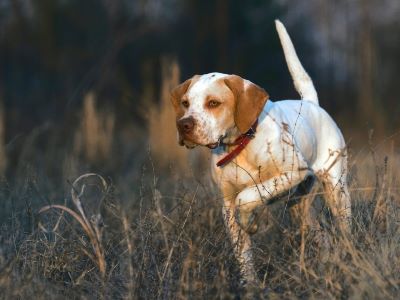
A pointer’s sense of smell taps into a bird’s location like a tracking beacon leading hunters on a treasure hunt for game. Their cat-like skill and bursts of speed help them find birds other dogs would miss.
When the shot goes off and feathers fill the air, joy is shared between the pointer and hunter for jobs well done.
3. Flushers
Flushers spark excitement when unleashed thanks to lively personalities impossible to ignore. Breeds like the English Springer Spaniel and Cocker Spaniel have perfected the art of mixing feathered game from hiding spots.
Springers do it with brawn and stamina, combining endless energy with determination to explore every possible hideout. Their muscular frames allow them to bulldoze through the worst cover in search of birds while charming all in their path with wagging tails.
Cockers rely more on finesse and flexibility to get the job done.
When birds finally take wing by their persistence, both flusher breeds kick into overdrive. Weaving through grass and brush, they track downed birds by sight and scent. Timely delivery to hand and excessive tail flick asks for more work.
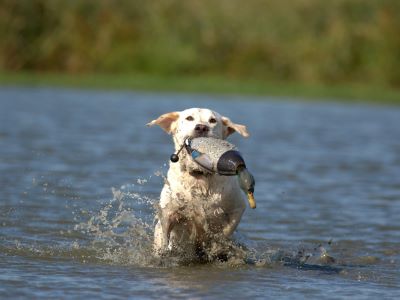
These flashy sparkplugs switch between intensity and comedy faster than a movie entertainer. But isn’t that what makes a day with flushers so fun? Who said hard work and entertainment can’t coexist? Flushers bridge that gap perfectly.
4. Setters
Setters are known for their grace and stamina. Their sharp sense of smell and endurance make them valuable allies in the pursuit of upland games.
English Setters and Irish Setters are praised for their elegance and effectiveness in the field. English Setters, with their stylish points and cooperative nature, bring a touch of class to bird hunting.
Irish Setters, with their unique appearance and boundless energy, cover ground efficiently in search of game. The partnership between setters and hunters is a memorable hunting experience in the field.
Training and Skills of Gun Dog
Now, let’s understand what the hype is all about. Different training and skills of gun dogs:
Obedience Training
Obedience is fundamental to a well-trained gun dog. Training commands such as “sit,” “stay,” and “come” establish a strong communication foundation between the handler and the dog.
These commands are the building blocks for more advanced skills and ensure that the dog can be handled effectively in the field. Recall (coming when called) and stay commands are important for hunting, and can be reinforced with the use of the best gun dog slip leads uk.
A responsive gun dog that returns quickly on command and stays in place when needed allows the handler to maintain order and complete precise hunting strategies.
Retrieving Skills
Retrievers specialize in intact delivery of birds to hand thanks to soft mouths and single-minded focus. Their field flexibility shines by handling all-size games gently yet efficiently.
A retriever’s readiness to battle tough terrain and water repetitively underscores their retrieving obsession and versatility.
The bottom line is if it falls, they’ll fetch it without fail!
Scent Training
Dogs are introduced to different scents, slowly building their ability to determine odours. This training sharpens their natural olfactory instincts, improving their capability to catch scents from a distance.
Gun dogs are taught to follow a scent trail left by a wounded or downed game. This skill is valuable during a hunt, ensuring that no game goes unseen.
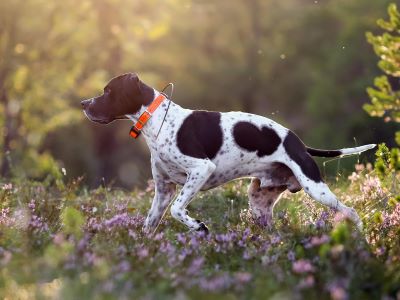
Gun Introduction
Gunshots are difficult but training builds confidence. Start low with pops, rewarding calm reactions, slowly increasing intensity. Maintain positivity throughout, praising when guns blast without reaction.
This structure conditions steadiness, forging boldness. Soon they’ll stand steady as shots ring without missing a beat. Confidence is now to be performed when guns fire.
Is a Gundog Breed Right for You?
Having a gundog is a thrilling experience, but it comes with responsibilities as well. Here are some things you need to keep in mind before adopting a gun dog:
- Regular check-ups and vaccinations are vital for your dog’s health. Preventive care, including flea and tick prevention, keeps your dog in good condition for hunting.
- A balanced and nutritious diet is the foundation of a healthy gundog. High-quality dog food, for your dog’s age and activity level, supports their energy needs for training and hunting.
- Gundogs are energetic breeds and require exercise to maintain physical fitness and mental well-being. Daily walks, runs, and playtime not only keep them physically fit, a tired dog is a happy dog.
- Engage your gundog’s sharp mind with puzzle toys, training sessions, and interactive games. Mental stimulation is just as crucial as physical exercise, stopping boredom and nurturing a well-adjusted, happy dog.
- Introduce your gundog to different environments early on so that they can gain familiarity with diverse terrains, and weather conditions. This will enhance their adaptability, making them more confident and reliable partners in hunting.
FAQs
❔Do Gun Dogs Bark?
Speaking through excitement is more difficult to assess as it can come from too much or too little game. If the dog only gets a flush or a retrieve as often as your team scores a goal, it may bark triumph, but this subsides when work becomes commonplace.
❔What Is a Gun Dog?
A gun dog is not just a dog but a skilled companion when you are out hunting. They are carefully bred and trained to assist hunters with their unique instincts and vital abilities. Gun dogs have a remarkable set of instincts that set them apart.
❔What Is the Smallest Gun Dog?
The Cocker Spaniel is the smallest of Britain’s gundogs. This high-energy hunter descends from ‘land’ spaniels, which were divided into ‘springing’ and ‘cocking’ spaniels based on the size of the pup.
❔How Do I Train My Gun Dog?
Training a gun dog is a rewarding but challenging task that requires patience, consistency, and positive reinforcement. There are different types of gun dogs, such as retrievers, spaniels, pointers, setters, and hunt, point, and retrieve dogs. Each type has its skills and characteristics, but they all share a common need for exercise, stimulation, and owner interaction.
❔What Is a British Breed of Retriever Gun Dog?
The Labrador Retriever is a British gun dog bred from Newfoundland fishing dogs in the 1800s. Named for the Labrador region of Canada, Labs helped retrieve nets and fish before their superior nose, soft bite, and obedience were harnessed for game hunting and shooting sports. Their talent and affection soon made them favoured companions around the globe.
Conclusion
In conclusion “What is a gun dog?” Gun dogs are exceptional partners for hunting. Their special talents for finding, pointing at, chasing out, and retrieving downed birds are instincts bred into resolver, pointer, flusher and setter breeds over generations.
To unlock their full potential, follow steps on how to train a gun dog through obedience, scent work, retrieving, and more. With the right training methods, nutrition, affection and vet care, you’ll create lasting memories with a loyal hunting companion.
But owning these energetic athletes comes with responsibilities too.
Handlers must remain active daily with their dogs and make sure to provide proper training, nutrition, affection and vet care. Do this, and you’ll be rewarded with a healthy and loyal gun dog with whom you can create lasting memories.
Reference:
- Gewirtz, E. W. (2023, August 7). Get to know the pointer breeds. American Kennel Club.



